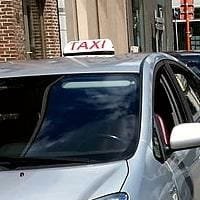(LUXEMBOURG) – The innovative Uber electronic taxi platform is still required to obtain necessary transport licences under national law, a European Court advocate general made clear in an opinion Thursday.
The Uber platform allows anybody with a smartphone with the Uber app (‘the App’) to order urban transport services in the cities where Uber has a presence.
The App recognises the location of the user and finds available drivers who are nearby. When a driver accepts a trip, the App notifies the user of such acceptance and displays the driver’s profile together with an estimated fare to the destination indicated by the user. Once the trip has been completed, the fare is automatically charged to the bank card which the user is required to enter when signing up to the App. The App also contains a ratings function, enabling drivers to be rated by passengers and vice versa. Average scores falling below a given threshold may result in exclusion from the platform. In the case of the service going by the name UberPop, non-professional private drivers transport passengers using their own vehicles.
In 2014 a Barcelona organisation representing taxi drivers in the city, Asociación Profesional Elite Taxi (‘Elite Taxi’), brought an action asking for penalties on the Spanish company Uber Systems Spain SL (‘Uber Spain’), for engaging in unfair competition towards Elite Taxi’s drivers. In particular, Elite Taxi maintained that Uber Spain is not entitled to provide the UberPop service in the city of Barcelona. Neither Uber Spain nor the drivers have the licences and authorisations required under the city of Barcelona’s regulations on taxi services.
In today’s Opinion, Advocate General Maciej Szpunar expalined that it must essentially be determined whether the services offered by the Uber platform benefit, as ‘information society services’, from the principle of the freedom to provide services or whether its services fall within the field of transport, which is regulated by the law of the Member States. In the first case, the licences and authorisations required by the city of Barcelona’s regulations concerning the operation of Uber could be incompatible with the principle of the freedom to provide services, whilst, in the second case, the Member States would in principle be free to regulate Uber’s activity.
The Advocate General took the view that, although it is for the national court to determine and assess the facts, the service in question is a composite service, since part of it is provided by electronic means while the other part, by definition, is not. A composite service may fall within the concept of ‘information society service’ where (1) the supply which is not made by electronic means is economically independent of the service which is provided by that means (as is the case, for example, of intermediation platforms for purchasing flights or making hotel bookings) or (2) the provider supplies the whole service (that is, both the part provided by electronic means and the part provided by other means) or exercises decisive influence over the conditions under which the latter part is provided, so that the two services form an inseparable whole, a proviso being that the main component (or indeed all essential elements of the transaction) is supplied by electronic means (as is the case, for example, of the online sale of goods).
According to the Advocate General, the service offered by Uber does not meet either of those two conditions. In that regard, the Advocate General observes that the drivers who work on the Uber platform do not pursue an autonomous activity that is independent of the platform. On the contrary, that activity exists solely because of the platform, without which it would have no sense. The Advocate General also points out that Uber controls the economically important aspects of the urban transport service offered through its platform. Indeed, Uber (i) imposes conditions which drivers must fulfill in order to take up and pursue the activity; (ii) financially rewards drivers who accumulate a large number of trips and informs them of where and when they can rely on there being a high volume of trips and/or advantageous fares (which thus enables Uber to tailor its supply to fluctuations in demand without exerting any formal constraints over drivers); (iii) exerts
control, albeit indirect, over the quality of drivers’ work, which may even result in the exclusion of drivers from the platform; and (iv) effectively determines the price of the service.
All those features mean that Uber cannot be regarded as a mere intermediary between drivers and passengers. In addition, in the context of the composite service offered by the Uber platform, it is undoubtedly transport (namely the service not provided by electronic means) which is the main supply and which gives the service meaning in economic terms.
The Advocate General concludes that, in relation to the supply of transport, the supply whereby passengers and drivers are connected with one another by electronic means is neither selfstanding (see point 1 above) nor the main supply (see point 2 above). Consequently, the service offered by Uber cannot be classified as an ‘information society service’. Instead, the service amounts to the organisation and management of a comprehensive system for on-demand urban transport. Moreover, Uber does not offer a ride-sharing service, since the destination is selected by the passenger and the driver is paid an amount which far exceeds the mere reimbursement of costs incurred.
Taking account of the fact that the supply of transport constitutes, from an economic perspective, the main component, whilst the service of connecting passengers and drivers with one another by means of the smartphone application is a secondary component, the Advocate General proposes that the Court’s answer should be that the service offered by the Uber platform must be classified as a ‘service in the field of transport’.
It follows from that interpretation that Uber’s activity is not governed by the principle of the freedom to provide services in the context of ‘information society services’ and that it is thus subject to the conditions under which non-resident carriers may operate transport services within the Member States (in this case, possession of the licences and authorisations required by the city of Barcelona’s regulations).








